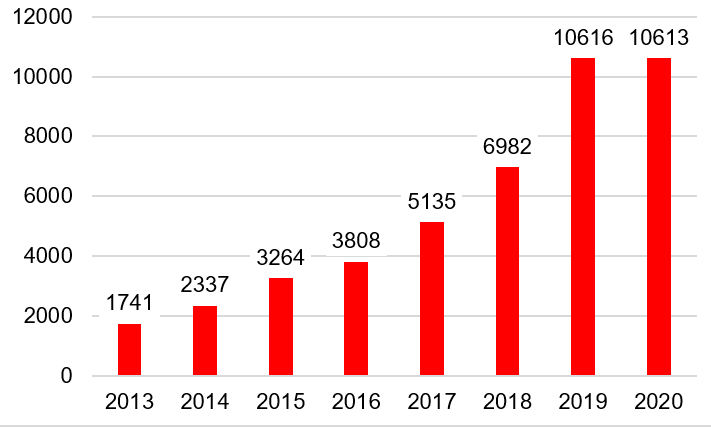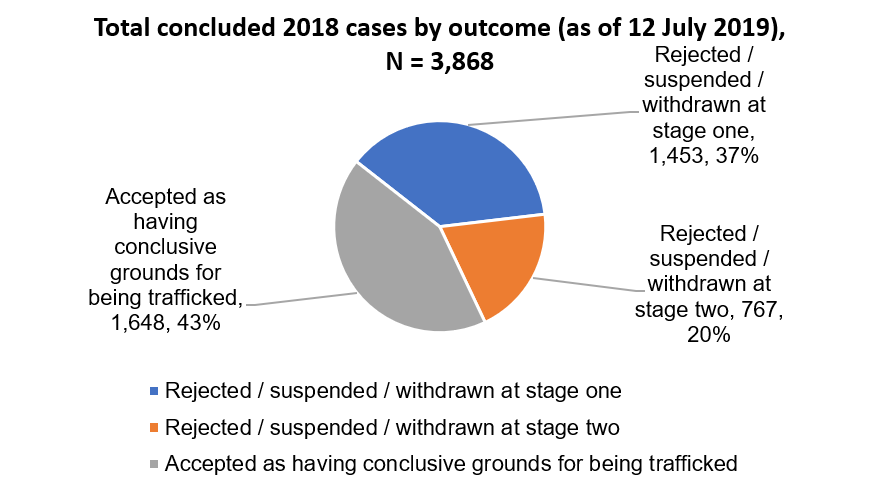1. Modern slavery and people trafficking are evils. The former is the “the recruitment, movement, harbouring or receiving of children, women or men through the use of force, coercion, abuse of vulnerability, deception or other means for the purpose of exploitation”.
Under Section 2, Part 1 of the Modern Slavery Act 2015, a person commits the offence of ‘trafficking’ if they arrange or facilitate the travel of another person with a view to [that person] being exploited. Meanwhile, the Home Office says that for a person to have been a victim of human trafficking there must have been:
- action (recruitment, transportation, transfer, harbouring or receipt, which can include either domestic or cross-border movement).
- means (threat or use of force, coercion, abduction, fraud, deception, abuse of power or vulnerability, except in the case of children).
- purpose of exploitation (eg sexual exploitation, forced labour or domestic servitude, slavery, removal of organs) – see Home Office guidance.
2. Victims of modern slavery can work in the construction industry, in agriculture, in the sex industry, and in places like nail bars, car washes, and cannabis farms. Victims can be trafficked from overseas – frequently from eastern Europe, south east Asia, and Africa. It is not of course only trafficked people who can end up as modern slaves. However, about 75% of those who are, are non-UK nationals who claim to have been trafficked. In one example, a ruthless gang that lured victims from Poland to the UK is believed to have enslaved around 300 vulnerable people [and made £2m]. Government estimates in 2017 put the cost of slavery on the country at up to £4.3 billion.
3. The laws on tackling this scourge were consolidated in 2015 into Theresa May’s Modern Slavery Act 2015. It is right that the government and law enforcement authorities do everything they can to eradicate this menace which has blighted so many lives. However, there is a risk that potential abuse of this legislation, possibly for immigration purposes among others, is making the public less safe and undermining border control by providing yet another loophole to be exploited by those with no right to be here, such as serious criminals, egged on by their legal representatives, in order to delay and prevent removal. This should be investigated by the government, and action taken to tighten the rules should endemic abuse be documented.
Detail
4. From 1 November 2015 (under the Modern Slavery Act – MSA) specified public authorities were required to notify the Home Office about any potential victims of modern slavery they encounter in England and Wales.
5. The National Referral Mechanism (NRM) is the framework for identifying and referring potential victims of modern slavery. Cases can be referred to the NRM by first responder organisations such as the Police or Border Force. On 29 April 2019 the Home Office assumed responsibility for all areas of the NRM, including referrals, decision making and data collection, taking over data collection from the National Crime Agency (NCA). Worryingly, the first annual report issued under this regime (in 2020) failed to report outcomes of claims, something that was a feature of previous reports when data collection was under the NCA.
6. Under current law, if someone is deemed to have reasonable grounds for being trafficked or a victim of modern slavery, they can be given accommodation, financial support, translation and interpretation services, transport and access to an outreach support worker.
Number of referrals processed each year
7. In 2019, 10,627 claims or referrals were processed by the authorities, a 52% rise from 6,986 referrals in 2018. The number of such cases has more than tripled since 2015.
Figure 1: Referrals under MSA 2015, 2013-2020 (see source).

8. Figures released by the government showed that 2,200, or well over half of nearly 3,900 cases opened in 2018 which had been ruled on as of July 2019 were deemed as not having potential or conclusive grounds for being trafficked (see Figure 2 below).
Figure 2: Outcome of concluded cases put forward in 2018 (as of July 2019) – see HM Government, 2019 Annual Report on Modern Slavery.

9. However, separate Home Office statistics suggest that the rejection rate in 2018-2020 has been lower – only about a third of concluded cases resulting in rejection, compared to just under half across the entire period 2014 to 2020. However, the positive rates for adults (18 and over) are lower.
10. As in the case of those arriving by illegal Channel crossing (the number of which, in 2020, was 29 times the total reported in 2018), where traffickers see a gap in our defences, they will exploit it to the hilt.
11. It is worth noting that Section 45 of the Modern Slavery Act 2015 created a defence for victims who commit criminal offences when they are compelled to do so (in the case of adults) or when they are deemed to have committed them as a direct consequence of being a victim of slavery / exploitation (see CPS guidance). The Modern Slavery Act also provides for Overseas Domestic Workers to be granted leave to remain if they have been determined to have been a victim of a) slavery or b) human trafficking.
12. Separate figures released by the campaign group After Exploitation showed that between January 2019 and September 2020, 4,102 people who were detained under immigration powers between January 2019 and September 2020 were referred to the NRM. However, of these, only 194 (5%) had been shown to have ‘positive conclusive grounds’ to be victims.
Are Modern Slavery laws being abused?
13. These provisions may unfortunately provide scope for some of those with no right to be in the UK (e.g. dangerous foreign criminals who are subject to deportation) to prevent their removal by making vexatious or spurious claims under these provisions.
14. Last year 23 Jamaican nationals, including murderers and rapists, were taken off a Home Office charter flight as lawyers made new claims including allegations that the criminals had been victims of modern slavery. Among those taken off was one person who was jailed for six years in 2014 for raping a woman who fell asleep on his sofa. It is not clear that this was a case of abuse of the MSA. Yet it is deeply concerning from the point of view of public safety.
15. Lord Chancellor Robert Buckland recently said: “The modern slavery laws are such an important, ground-breaking piece of legislation. It breaks my heart to think it might be potentially open to abuse by people just because they want to launch another argument to buy them more time.”
16. Political opposition to the enforcement of immigration laws is making it harder and harder to police our borders. In December 2020, Migration Watch UK published a summary detailing the collapse of border enforcement and the dearth of resources available for the task. In August 2020 we also pointed to evidence that our asylum process is being regularly abused (see article).
Conclusion
17. It is worrying that legislation aimed at helping the vulnerable may be open to widescale abuse by those who are simply seeking to avert removal from the UK. Yet recent figures show that nearly two in three cases referred were judged not to have potential or conclusive grounds for being deemed a victim. It is essential to conduct an early review of how the MSA 2015 is operating in practice in order to assess any extent of potential abuse. Then, if it is found, decisive action must be taken to stop it.
